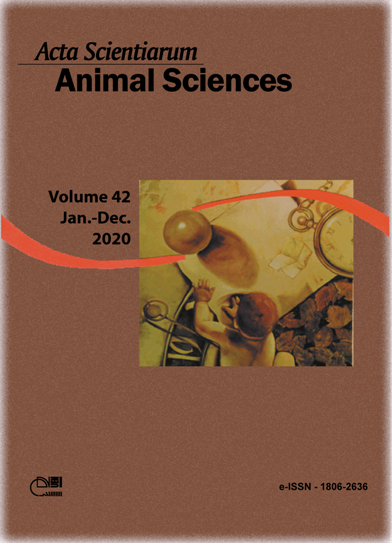Okara or soybean grain added to the rehydrated corn grain silage for cattle: digestibility, degradability and ruminal parameters
Resumo
The experiment was carried out to evaluate total and partial digestibility of nutrients, the efficiency of microbial protein synthesis, in situ degradability and ruminal parameters in cattle fed diets with rehydrated corn grain silages, okara or soybean grain. Three Holstein steers were distributed in a 3 x 3 Latin square design. The treatments evaluated were: SO (corn grain silage + 30% okara), SSG (corn grain silage + 20% soybean grain) and CG (dry corn grains). The ruminal digestibility of non-fiber carbohydrates (NFC) increased in SO (88.34%) and SSG treatments (87.87%), compared to the CG treatment (63.48%). The minimum ruminal pH value was 6.01, observed 4.13 hours after feeding a diet with SO. The highest ammonia-N contents were 15.25 and 15.07 mg dL-1 observed in SSG and SO, respectively, 2.45 and 2.61 hours after feeding. Treatments SO and SSG showed higher fraction A content (readily degradable fraction) and C (constant rate of degradability of fraction B). The effective degradability (ED) of dry matter (DM) was higher for the diets SO and DE of CP was higher for treatments SO and SSG. SSG and SO result in better utilization of nutrients by animals.
Downloads
Referências
Association of Official Analytical Chemists [AOAC]. (1990). Official Methods of Analysis (15th ed.). Washington, DC: AOAC International.
Association of Official Analytical Chemists [AOAC]. (2006). Official Methods of Analysis (18th ed.). Gaithersburg, MD: AOAC International.
Arcari, M. A., Martins, C. M. M. R. T. T., & Santos, M. V. (2016). Effect of the ensiling time of hydrated ground corn on silage composition and in situ starch degradability. Brazilian Journal of Veterinary Research and Animal Science, 53(1), 60-71. doi:10.11606/issn.1678-4456.v53i1p60-71
Bürger, P. J., Pereira, J.C., Coelho da Silva, J. F. C., Valadares Filho, S. C., Cecon, P. R., Jordão, C. P., & Braz, S.P. (2000). Taxas de Passagem e Cinética da Degradação Ruminal em Bezerros Holandeses Alimentados com Dietas Contendo Diferentes Níveis de Concentrado. Revista Brasileira de Zootecnia, 29(1), 225-235. doi: 0.1590/S1516-35982000000100030
Bowles, S., & Demiate, I.M. (2006). Caracterização físico-química de okara e aplicação em pães do tipo Francês. Ciência e Tecnologia de Alimentos, 26(3), 652-659. doi: 0.1590/S0101-20612006000300026
Calixto Junior, M., Jobim, C. C., Osmari, M. P., & Tres, T. T. (2017). Nutritional additives in high moisture corn silage. Revista Brasileira de Ciências Agrária, 12(1), 105-111. doi: 10.5039/agraria.v12i1a5413
Casali, A. O., Detmann, E., Valadares Filho, S. C., Pereira, J. C., Henriques, L. T., Freitas, S. G., & Paulino, M. F. (2008). Influência do tempo de incubação e do tamanho de partículas sobre os teores de compostos indigestíveis em alimentos e fezes bovinas obtidos por procedimentos in situ. Revista Brasileira de Zootecnia, 37(2), 335-342. doi: 10.1590/S1516-35982008000200021
Cecava, M. J., Merchen, N. R., Gay, L. C., & Berger, L. L. (1990). Composition of ruminal bacteria harvested from steers as influenced by dietary energy level, feeding frequency, and isolation techniques. Journal of Dairy Science, 73(9), 2480-2488. doi:10.3168/jds.S0022-0302(90)78933-3
Chaney, A. L., & Marbach, E. P. (1962). Modified reagents for determination of urea and ammonia. Clinical Chemistry, 8, 130-137.
Geweke, J. (1992). Evaluating the accuracy of sampling‐based approaches to the calculation of posterior moments. In J. M. Bernardo, J. O. Berger, A. P. Dawid, & A. F. M. Smith (Orgs.), Bayesian Statistics 4. Oxford, UK: Oxford University Press.
Harthan, L. B, & Cherney, D. J. R. (2017). Okara as a protein supplement affects feed intake and milk composition of ewes and growth performance of lambs. Animal Nutrition, 3(2), 171-174. doi: 10.1016/j.aninu.2017.04.001
Heidelberger, P., & Welch, P. (1983). Simulation run length control in the presence of an initial transient. Operations Research, 31(6),1109-44. doi: 10.1287/opre.31.6.1109
Hoffman, P. C., Esser, N. M., Shaver, R. D., Coblentz, W. K., Scott, M. P, Bodnar, A. L., … Charley, R. C. (2011). Influence of ensiling time and inoculation on alteration of the starch-protein matrix in high-moisture corn. Journal of Dairy Science, 94, 465-2474. doi: 10.1287/opre.31.6.1109
Hoover, W. H., & Stockes, S. R. (1991). Balancing carbohydrates and proteins for optimum rumen microbial yield. Journal of Dairy Science, 74(10), 3630-3644. doi: 10.3168/jds.S0022-0302(91)78553-6
Jobim, C. C., Branco, A. F., Gai, V. F. Calixto Junior, M., & Santos, G. T. (2010). Qualidade da silagem de grãos de milho com adição de soja crua e parâmetros de digestibilidade parcial e total em bovinos. Arquivo Brasileiro de Medicina Veerinaria e Zootecnia, 62(1), 107-115. doi: 10.1590/S0102-09352010000100015
Kung J. L., Shaver, R. D., Grant, R. J., & Schmidt, R.J. (2018). Silage review: Interpretation of chemical, microbial, and organoleptic components of silages. Journal of Dairy Science, 101(5), 4020-4033. doi: 10.3168/jds.2017-13909
Mehrez, A. Z., & Orskov, E. R. (1977). A study of the artificial fiber bag technique for determining the digestibility feeds in the rumen. Journal of Agricultural Science, (88), 645-650. doi: 10.1017/S0021859600037321
Mertens, D. R. (2002). Gravimetric determination of amylase-treated neutral detergent fiber in feeds with refluxing in beakers or crucibles: collaborative study. Journal of AOAC International, 85(6), 1217-1240.
Mirzaei-Aghsaghli, A., & Maheri-Sis, N. (2008). Nutritive value of some agroindustrial by-products for ruminants: a review. World Journal of Zoology, 3, 40-46.
National Research Council [NRC]. (2000). Nutrient requirements of fish and shrimp. Washington, DC: The National Academies Press.
Orskov, E. R., & McDonald, I. (1979). The estimation of protein degradability in the rumen from incubation measurements weighted according to rate of passage. Journal of Agriculture Science, 92(2), 499-503. doi: 10.1017/S0021859600063048
Powell, J. M., Wattiaux, M. A., & Broderick, G. A. (2011). Short communication: Evaluation of Milk urea nitrogen as a management tool to reduce ammonia emissions from dairy farms. Journal of Dairy Science, 94(9),4690-4694. doi: 10.3168/jds.2011-4476
Passini, R., Silveira, A. C., Rodrigues, P. H. M., Castro, A. L., Titto, E. A. L., Arrigoni, M. B., & Costa, C. (2002). Digestibilidade de dietas a base de grão úmido de milho ou de sorgo ensilados. Acta Scientiarum. Animal Sciences, 24,1147-1154. doi:10.4025/actascianimsci.v24i0.2604
R Development Core Team. (2015). R: A language and environment for statistical computing. Vienna, AU: R Foundation for Statistical Computing.
Redondo-Cuenca, R. A., Suárez, M. J. V., & Aparicio, I. M. (2008). Soybean seeds and its by-product okara as sources of dietary fibre. Measurement by AOAC and Englyst mehods. Food Chemistry, 108(1), 1099-1105. doi: 10.1016/j.foodchem.2007.11.061
Reis, R. A., Jobim, C. C.; Macedo, F. A., Martins, E. N., Cecato, U. & Silveira, A. (2001). Desempenho de cordeiros terminados em confinamento, consumindo silagens de milho de grãos com alta umidade ou grãos de milho hidratados em substituição aos grãos de milho seco da dieta. Revista Brasileira de Zootenia, 30, 596-603, 2001. doi: 10.1590/S1516-35982001000200040
Rodríguez, R., Sosa, A., & Rodríguez, Y. (2007). Microbial protein synthesis in rumen and its importance to ruminants. Cuban Journal of Agricultural Science, 41(4), 287-294.
Rossi, R. M. (2011). Introdução aos métodos Bayesianos na análise de dados zootécnicos com uso do WinBUGS e R. Maringá, PR: Eduem.
Satter, L. D., & Slyter, L. L. (1974). Effect of ammonia concentration on rumen microbial production in vitro. British Journal of Nutrition, 32(2), 199-208. doi: 10.1079/BJN19740073
Silva, J. S., Borges, A. L. C. C., Lopes, F. C. F., Silva, R. R., Vieira, A. R., Duque, A. C. A, ... Gonçalves, L. C. (2014). Degradabilidade ruminal in situ do sorgo grão em diferentes formas de reconstituições. Arquivo Brasileiro de Medicina Veterinária e Zootecnia, 66(6), 1822-1830. doi: 10.1590/1678-6731
Silva, M. R. H., Jobim, C. C., Neumann, M., & Osmari, M. P. (2018). Corn grain processing improves chemical composition and fermentative profile of rehydrated silage. Acta Scientiarum. Animal Sciences, 40, e42564. doi: 10.4025/actascianimsci.v40i1.42564
Silva, D. J., & Queiroz, A. C. (2002). Análise de alimentos: métodos químicos e biológicos (3a ed.). Viçosa, MG: UFV.
Sniffen, C. J., O’Connor, J. D., Van Soest, P. J., Fox, D. G., & Russel, J. B. (1992). A net carbohydrate and protein system for evaluating cattle diets. II. Carbohydrate and protein availability. Journal of Animal Science, 70(11),3562-3577. doi: 10.2527/1992.70113562x
Swenson, M. J., & Reece, W. (1996). Dukes fisiologia dos animais domésticos (11a ed.). Rio de Janeiro, RJ: Guanabara.
Ushida, K., Lassalas, B., & Jouany, J. P. (1985). Determination of assay parameters for RNA analysis in bacterial and duodenal samples by spectrophotometry: Influence of sample treatment and preservation. Reproduction Nutrition Developmen, 25(6), 1037-1046. doi: 10.1051/rnd:19850804
Van Soest, P. J., Robertson, J. B., & Lewis, B. A. (1991). Symposium: carbohydrate methodology, metabolism, and nutritional implications in dairy cattle. Journal of Dairy Science, 74(10), 3583-3597. doi:10.3168/jds.S0022-0302(91)78551-2
Vargas Junior, F. M., Sanchez, L. M. B., Wechsler, F. S., Bianchini, W., Oliveira, M. V. M., & Schmidt, P. (2011). Influence of corn processing provided in the diet on the ruminal dynamics of dairy steer. Revista Brasileira de Zootecnia, 40(2), 433-440. doi:10.1590/S1516-35982011000200027
DECLARAÇÃO DE ORIGINALIDADE E DIREITOS AUTORAIS
Declaro que o presente artigo é original, não tendo sido submetido à publicação em qualquer outro periódico nacional ou internacional, quer seja em parte ou em sua totalidade.
Os direitos autorais pertencem exclusivamente aos autores. Os direitos de licenciamento utilizados pelo periódico é a licença Creative Commons Attribution 4.0 (CC BY 4.0): são permitidos o compartilhamento (cópia e distribuição do material em qualqer meio ou formato) e adaptação (remix, transformação e criação de material a partir do conteúdo assim licenciado para quaisquer fins, inclusive comerciais.
Recomenda-se a leitura desse link para maiores informações sobre o tema: fornecimento de créditos e referências de forma correta, entre outros detalhes cruciais para uso adequado do material licenciado.









































